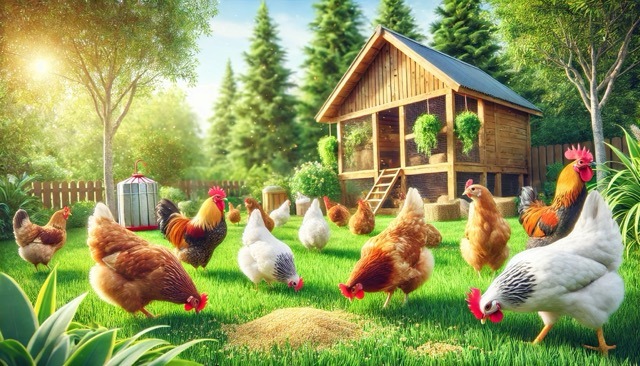
Best Diet for Backyard Chickens: What to Feed and What to Avoid
Raising backyard chickens is a rewarding experience, and one of the most important responsibilities you’ll have is ensuring they get the right nutrition. A balanced diet is essential for their health, productivity, and overall happiness. Whether you’re new to chicken keeping or looking to refine your flock’s nutrition, understanding what to feed and what to avoid will help your chickens thrive.
What to Feed Your Backyard Chickens
A healthy chicken diet consists of a variety of grains, proteins, vitamins, and minerals. Here’s a breakdown of the best foods to provide your backyard flock:
1. Commercial Layer Feed
The cornerstone of your chickens’ diet should be a high-quality commercial layer feed. These feeds are specially formulated with the right balance of protein, calcium, and other nutrients needed for egg production and overall health. They come in various forms such as pellets, crumbles, or mash, and typically contain around 16% protein, which is ideal for laying hens.
2. Grains and Seeds
Chickens enjoy a variety of grains like corn, wheat, oats, and barley. These grains provide energy and help keep your chickens feeling full. You can offer whole grains as part of their scratch feed, which is a supplemental treat rather than a primary food source.
3. Vegetables and Greens
Leafy greens and vegetables are excellent sources of vitamins and minerals for your chickens. Some of their favorite greens include spinach, kale, lettuce, and cabbage. You can also offer them vegetable scraps from your kitchen, like carrot tops, broccoli, zucchini, or cucumbers. Just ensure that any vegetables you give are fresh and pesticide-free.
4. Protein-Rich Foods
Protein is vital, especially during the molting season or for growing chickens. Besides the protein in layer feed, you can supplement their diet with insects like mealworms, black soldier fly larvae, or scrambled eggs. Chickens also love to forage for bugs and worms in your yard, which provides natural protein.
5. Calcium Sources
For egg-laying hens, calcium is essential to produce strong eggshells. A deficiency can lead to soft-shelled or misshapen eggs. Crushed oyster shells or limestone grit are commonly used as calcium supplements. You can also offer crushed eggshells, just be sure they’re thoroughly cleaned and baked first to avoid bacteria.
6. Fruits
Chickens love fresh fruit, and it can be a healthy treat when given in moderation. Some favorites include berries, apples (without seeds), watermelon, and bananas. However, fruit should not replace their main feed and should be given sparingly due to its high sugar content.
7. Grit
Chickens don’t have teeth, so they rely on grit to help grind up their food in their gizzard. If your chickens are free-ranging, they may find natural grit in the form of small stones or sand. For chickens kept in a coop or run, providing commercial grit is important for their digestion.
Foods to Avoid Feeding Your Chickens
While chickens are not particularly picky, there are certain foods that can be harmful or even toxic to them. It’s crucial to know what to keep out of their diet to avoid health problems.
1. Raw or Dried Beans
Uncooked beans contain a compound called lectin, which can be toxic to chickens. If you want to offer beans, be sure to thoroughly cook them first to remove any harmful substances.
2. Avocado (Especially the Pit and Skin)
Avocado contains persin, a fungicidal toxin that can cause respiratory issues, heart problems, or even death in chickens. While the flesh of the avocado is less toxic, it’s best to avoid feeding any part of the avocado, especially the pit and skin.
3. Green Potatoes and Tomato Leaves
Both potatoes and tomatoes belong to the nightshade family and can contain solanine, a harmful substance found in green or sprouted potatoes and the leaves of tomato plants. Be sure to remove any green or sprouted potatoes from your kitchen scraps before offering them to your chickens.
4. Chocolate
Like many animals, chickens should never eat chocolate, as it contains theobromine, a compound toxic to them. Chocolate can cause heart problems, digestive issues, and in severe cases, death.
5. Moldy or Spoiled Food
Never feed your chickens moldy or spoiled food. Chickens are sensitive to bacteria and toxins found in rotting food, which can lead to illness. Always check the freshness of kitchen scraps before tossing them into the coop.
6. Salty and Sugary Foods
Foods that are high in salt or sugar, such as processed snacks, chips, or sugary cereals, are not suitable for chickens. Excessive salt can lead to dehydration and kidney problems, while too much sugar can disrupt their digestion and lead to obesity.
7. Citrus Fruits
While not necessarily toxic, citrus fruits like oranges and lemons can interfere with calcium absorption and may affect egg production. It’s best to limit or avoid feeding citrus to your flock.
8. Onions and Garlic in Excess
Onions contain a compound called thiosulfate, which in large quantities can cause hemolytic anemia in chickens. While garlic is less problematic and can even have some health benefits in small amounts, it should still be used sparingly.
Conclusion
Feeding your backyard chickens a well-balanced diet is key to keeping them healthy and productive. A mix of commercial layer feed, grains, fresh vegetables, and the occasional treat will ensure they get the nutrients they need. Always be mindful of what you’re feeding your flock, and avoid harmful or toxic foods that could put their health at risk. By providing the right diet, your chickens will reward you with delicious eggs, a happy presence in your backyard, and many years of companionship.
Take good care of your flock, and they’ll take good care of you!
